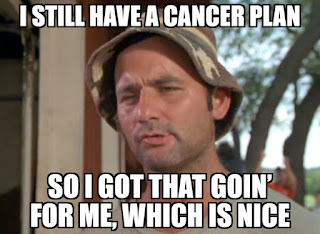I have spent a good portion of my insurance career working in the worksite benefits arena, helping people choose which insurance plans are best for them and their families. The employers decide which plans they want to offer and then we, as benefits counselors, sit down with the employees individually to discuss the different types of coverage. These ancillary or "voluntary" insurance products are deducted from their paycheck and the employees appreciate the convenience of it, but also are aware that their take home pay will be lower.
Many times the menu of coverages includes insurance policies for disability, cancer, hospital indemnity, accidents, critical illness, heart and stroke, and of course, life insurance. The employees can opt to cover themselves, a spouse, children or the entire family.
One of the many factors that the employees like is the "portability" of the policies, which means that if they leave their job they can take the coverage with them. And herein lies the rub.
Not everyone leaves their job for greener pastures. Some may decide to move on to open their own business or to retire with a pension. For those people portability is a good thing because they probably can afford to continue paying those premiums on their own.
As we have seen with the Covid_19 epidemic, others may be laid off, fired, furloughed or just quit. For these folks, losing a paycheck may be the end of their coverage, as they probably will not have the funds to keep paying for those extra coverages.
One of the issues here is that when these people originally purchased these plans, they were quoted premiums based on their pay frequency. In other words, if someone is paid weekly, the agent would say that a cancer plan is $6 each pay, because that is how much is coming out of their check. That doesn't sound as bad as $25 each month and most people don't do the math.
A few weeks after the employee loses his or her job, they will get a notice in the mail asking them if they want to continue the coverage with a couple of options. One option is to have the premiums drafted out of their bank account or paid quarterly. Using our example above, the person who is now unemployed is being asked to write a check for $75. If they have not yet found another job, that money probably won't be in there budget either.
Another issue here is that many people simply do not have jobs that offer these benefits. For those individuals, who like us, are self-employed, small business owners or contract employees, voluntary benefits are not available.
With this in mind, we have decided to begin offering our menu of supplemental policies on an individual basis. It doesn't matter if you run a business from home or out of your car. Everyone can now apply for coverages they want or need. A few examples are:
- Disability insurance - Business owners are usually working longer hours, no matter what the profession. If you are out of work and can't work, those bills don't stop coming in.
- Hospital Indemnity - These plans cover you for being in the hospital. With Covid_19 in the news lately people have started to express more interest in this plan.
- Cancer - We all know someone who has been affected by cancer and for many people a good cancer plan gives them peace of mind.
- Accident insurance - If you are active, work a physically demanding job or have kids who play sports a good accident plan can help you with sudden out-of-pocket expenses.
Chris Castanes is the president of Surf Financial Brokers, helping people find affordable life and disability insurance coverage. He's also is a professional speaker helping sales people be more productive and efficient and has spoken to professional and civic organizations throughout the Southeast. And please subscribe to this blog!






